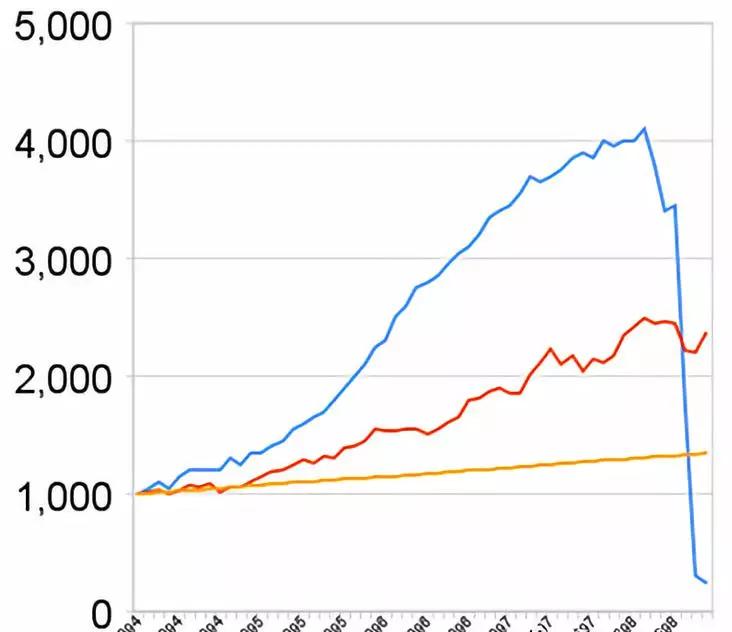Most people's growth comes from painful experiences, and rather than marveling at the success and legend of investment masters, they may be able to gain more insights about investment and risk from their painful experiences of failure.
Today's opening article I will introduce you to the rise and fall of a top Wall Street hedge fund company in the 1990s, which is a classic case of modern business school courses, which has made Buffett strangled.
The rise and fall of the Genius Dream Team
The company's name is "long-term capital", which can be said to be born with a golden spoon, the founder is Melivet, the father of Wall Street bond arbitrage, who is known as "turning stones into gold", and the backbone of the team is two Nobel Laureates in Economics, and one is a former deputy secretary of finance and vice chairman of the Federal Reserve.
Therefore, this company is considered to be the company with the highest IQ density in the world, with the title of "Genius Dream Team".
Their investment strategy is calculated through a computer precision model, finds an abnormal market price difference, and then arbitrages into the market through financial leverage.
From 1994 to 1997 they turned genius into amazing profits. In the 10 months after its establishment, the return rate was as high as 20%. The return was 43% in 1995, 41% in 1996, 27% in 1997 and, even more amazing, the largest monthly drawdown was only 2.9%. And all quarterly earnings are positive.
The Economist magazine commented that they changed risk management from gaming to science.

$1,000 to invest in the difference between long-term capital (blue), dow jones index (red) and U.S. Treasury (yellow) (1994-1998)
The unlimited long-term capital has attracted a large number of investors, including many industry leaders such as Merrill Lynch, Bank of Taiwan, Hong Kong Property Authority, Bank of Italy and so on.
Investors who rush into it don't think about the risk, and even the founders scratch their heads and don't know where the risk is, because according to their model, things like the East Asian financial crisis don't break out every 10 billion years.
Unfortunately, the financial crisis really broke out, and the aftermath rippled, and soon spread to Russia, Brazil and other countries. Originally a bond-only investment, long-term capital has since ventured into equity investments, mergers and acquisitions, and has also invested heavily in emerging markets.
Long-term capital sees this as a once-in-a-century buying opportunity, as the market will soon return from panic and the Russian authorities will certainly come to the rescue of debts and the market.
Instead, Russia abruptly issued a statement that they would not consider repaying foreign and domestic debts, which models of long-term capital could not predict, and the company soon found itself bleeding like money every day.
During this period, the founders found Buffett, Soros, and also looked for Lehman Brothers, Merrill Lynch, and UBS, but no one was willing to help.
Long-term capital fell to 90% of its net asset value in just 150 days, on the verge of bankruptcy.
Later, the Federal Reserve came forward to find the bigwigs of major financial institutions to take over. A generation of Wall Street financial superstars fell. Buffett later said that if I were to write a book about it, it would be titled "Why Smart People Do Stupid Things."
Perception of risk and concentration of positions
Reviewing history is to wake up to the present.
First of all, investment at any time can not ignore the risk, even if the financial crisis, bond default such a small probability of risk;
Secondly, long-term capital has been doing long on a large scale, the risk concentration is very high, and there is no hedging. The world of investment and life is power-rate distributed, and a very small number of opportunities may bring huge benefits, but also imply unexpected risks.
Before I saw a hot post, a shareholder said that due to the whole position of a leading stock, in just three months not only lost 1 million of the principal, even the loan also lost a lot, and his monthly salary is only more than 6,000, the stock market to make money to buy a house disappointed, not to mention, but also to consider how to repay the loan, and how to confess to the family.
At the end of the post, he said bitterly, "How I wish these 3 months were a dream, but unfortunately this is a bloody reality."
However, the world of investing is cruel, and if the concentration of risk and positions is too high, even the smartest people may lose out in a black swan event.
Southern Baoyu will focus on new issues from February 10
Since 2021, in the context of the continuous exploration of the equity market and the unclear main line of the market, many people have realized the importance of asset allocation, and fixed income + products with both equity and debt and lower risk than the stock base have been favored.
I have also introduced fixed income + products to you many times. The keyword of 2022 investment cannot avoid "fixed income +".
Speaking of this, to remind you, February 10 today's 19-year veteran, southern fixed income + soul figure Sun Lumin brought Southern Baoyu, another new member of the "Bao" family, the A code 012945, continue the investment concept of social security and annuity.
Source: Nan Fan calmly, filmed during the Spring Festival Beijing Winter Olympics scene, authorized for use by the Southern Fund.
Well, that's all for today, see you tomorrow.
(Investment is risky, you need to be cautious when entering the market)